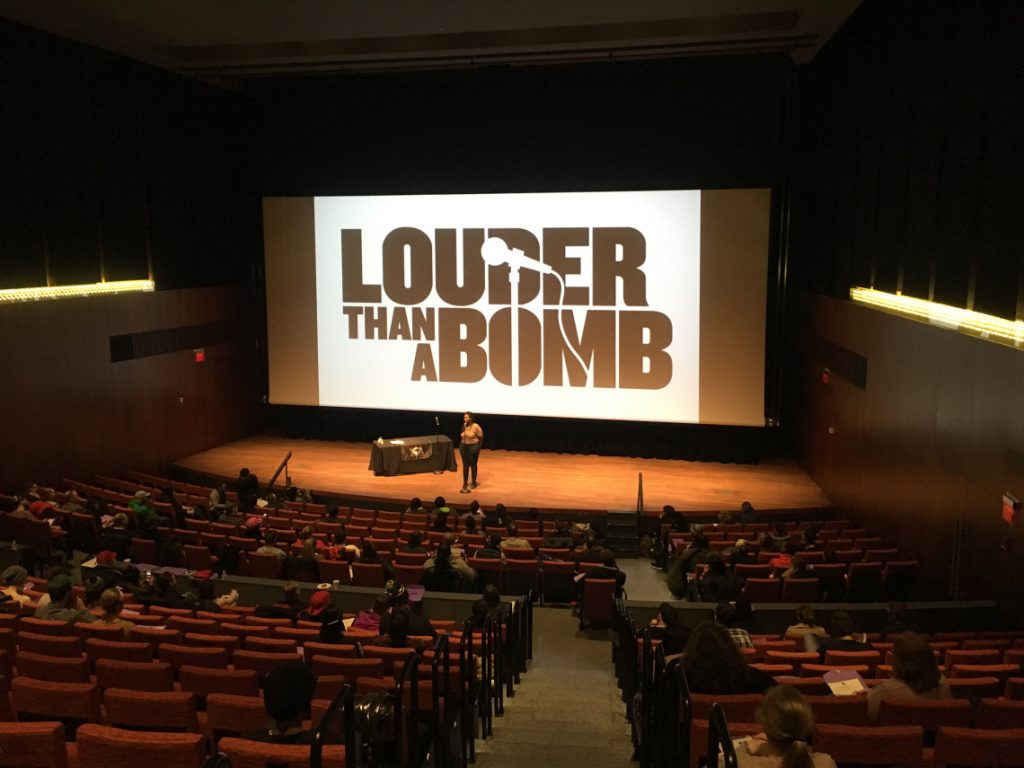
How Louder Than A Bomb Unites Chicago’s Youth
By Marlena Wadley and Tommy Brannigan
photos via YCA
It’s no secret that Chicago is one of the most racially segregated cities in America. Constantly under speculation because of the violence, many benefactors to the city go by as unsung heros. However, their efforts to build a better community in the city have resulted in the largest annual poetry festival in the country, Louder Than A Bomb.
This Sunday (January 15), LTAB kicked off its 17th year with its annual coaches meeting, where novice and veteran coaches come together to discuss the year’s theme, and prepare for the start of the festival.
One of LTAB’s main goals is to instill positivity and unity within communities and its more than 1,000 youth participants. LTAB founder Kevin Coval notes, “[LTAB] brings young writers together, especially because Chicago is so segregated. It allows there to be a central, convenient space for the youth.”
LTAB is a result of discussions between teachers, artists, and educators on how to engage Chicago’s youth, with the goal to work and build with students, and to talk about and organize what their city should be like. Opposing views would suggest young people don’t like poetry or don’t have anything important to say, however LTAB has proven to build fellowship and develop a community with a shared culture.
When asked what she appreciated about the festival, LTAB alum and YCA’s Associate Artistic Director Jamila Woods says, “LTAB is a perfect metaphor for all the things that are important to me as an educator, organizer, and artist. It brings people together of different backgrounds and the idea of it being a space for listening — that was one of the things that before I even did LTAB, was really cool to me [at YCA].”
Not only does the competition give youth around the nation a platform to be heard, it also adds a sense of peace in a city that is often perceived as violent. Chicago’s Steinmeitz College Prep coach James Sloane reveals, “In our city, there is always so much focus on violence but then you have this great event that has been going on for a long time. It’d be nice if people could understand and focus on the good things we’ve been trying to do.”
Each year, the festival holds a theme; this year pays tribute to Chicago native and Pulitzer Prize winning poet Gwendolyn Brooks. Her work has influenced not only writers all over the world but many coaches, LTAB alumni, and participants. Woods explains why exploring Gwendolyn Brooks is one of the things she’s most excited about this year: “I’m very excited to know that there’s poets who probably don’t know who she is. It’s different than if your English teacher came in and was like, ‘Okay, we are going to learn about Gwendolyn Brooks.’ I think this is a very experiential way to learn about a really important Chicago poet.”
We asked a handful of coaches about their favorite thing about LTAB, favorite memories, something they look forward to this season, and what they think is special about their teams.

Angela Miller,
Favorite part about LTAB: My favorite part is being able to witness students figuring out how they wanna express
Favorite LTAB memory: There’s one student in particular who was incredibly shy and he didn’t speak for the first two months of

Jesus Sanchez, Little Village Lawndale High School
Favorite part about LTAB: There is a critical consciousness in the students that perform their poetry. I think that it’s [important] for a city that is as segregated as Chicago is to find a neutral space that maybe is not so neutral, and puts people outside of their comfort zone and forces the community of poets to get know each other. Especially in a city where African-American communities are segregated, Latino communities are segregated, and white communities are segregated. It’s important to have
Favorite LTAB Memory: My favorite memory about LTAB was… in 2012, [our team] went to semi-finals. One of my students said to me right before we were about to go into our

David Hossler. Merrillville High School
Favorite part about LTAB: I love the fact that young people’s voices are respected, I love the fact the student poets take
So that opportunity sounds crazy to say, “Failure is great”—it’s not. But the opportunity to take a risk where it could go well or it could go poorly and you deal with the consequences regardless is one of the most important life lessons. And you learn from situations like that, that even if you mess up once, it doesn’t have to go that way all the time. You can learn from it and learn how to learn how to do better next time.
Favorite LTAB Memory: I think my first year, my first preliminary. The first time you check it out, I don’t think it’s anything you can quite reexperience. I was really moved. I was just in the audience, just being there you know. It was really special to the point where as much work as it is and all this extra time, and I’m being paid 40 bucks a month to do this—and that’s before taxes, so that’s 30 dollars I make a month to run this club, but you know it’s worth it.

Something special about your team: Linguistic creativity. One of the things I push for my kids is to talk about those cliché things in not so cliché ways. So if you’re gonna talk about love you need to say it in a way that’s never been said before. If you’re gonna talk about violence in Chicago, then say it in a way that’s never been said before. So a lot of our pieces are super creative and like super off the cuff. Not what you would expect but still be about topics that are super relatable.
Something you’re looking forward